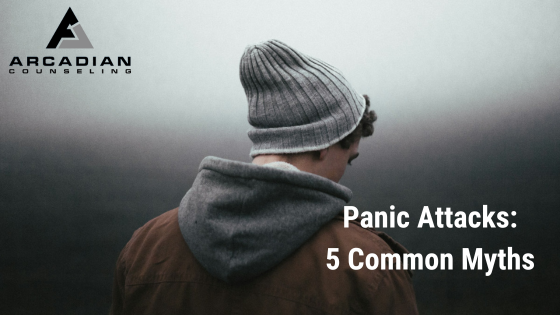Make no mistake; panic attacks are terrifying to experience. They consist of episodes of intense fear and discomfort that can strike unexpectedly, leaving one feeling helpless and overwhelmed. Despite their prevalence (up to 35% of Americans will experience one in their lifetime!), panic attacks are still clouded by misconceptions and myths that can perpetuate fear and stigma.
5 Common Myths about panic attacks

Myth 1: Panic Attacks are Signs of Weakness
Maybe the biggest myth surrounding panic attacks is that they’re a sign of weakness or an inability to cope with stress. This couldn’t be further from the truth. Panic attacks are not a reflection of someone’s character or strength; rather, they are a physiological response to perceived danger or threat. The body’s fight-or-flight response kicks in, releasing a surge of adrenaline and other stress hormones, causing intense physical sensations and overwhelming fear.
People who experience panic attacks are often dealing with underlying stressors, trauma, or biological predispositions. Seeking help and support for panic attacks is a courageous step towards managing one’s mental health, not a sign of weakness.
Myth 2: Panic Attacks are Just a Phase

Some may dismiss panic attacks as a passing phase or something that will go away on its own with time. However, panic attacks are a serious mental health condition that require attention and support. While some individuals may experience isolated panic attacks, others may develop panic disorder, a chronic condition characterized by recurrent panic attacks and persistent anxiety about future attacks.
Ignoring or downplaying the significance of panic attacks can even exacerbate symptoms and lead to increased distress over time. Early intervention and appropriate treatment, such as therapy and medication, can help individuals manage panic attacks effectively and prevent them from escalating into more severe mental health issues.
Myth 3: Panic Attacks are Triggered by Specific Situations
While certain situations or triggers can precipitate panic attacks for some individuals, not all panic attacks are directly linked to external factors. Panic attacks can occur seemingly out of the blue, without any identifiable trigger, leading to confusion and frustration for those experiencing them.
These unexpected panic attacks can occur at any time, even during periods of relaxation or sleep. Understanding that panic attacks can manifest without an apparent cause is vital in providing support to individuals struggling with these unexpected episodes.
Myth 4: Panic Attacks are Just a Form of Anxiety

While panic attacks and anxiety disorders share similarities, they are distinct experiences with unique characteristics. Anxiety disorders involve excessive worry, fear, or apprehension about future events, whereas panic attacks are sudden, intense episodes of fear accompanied by physical symptoms such as rapid heartbeat, chest pain, trembling, and shortness of breath.
While panic attacks can occur within the context of an anxiety disorder, they can also manifest independently, such as in panic disorder. Recognizing the differences between anxiety and panic attacks is essential for accurate diagnosis and appropriate treatment planning.
Myth 5: You Can Simply “Snap Out Of” a Panic Attack
One of the most harmful myths surrounding panic attacks is the notion that one can simply “snap out of it” or control their symptoms through willpower alone. In reality, panic attacks are involuntary responses driven by physiological and psychological factors that are beyond a person’s immediate control.
Telling someone to “calm down” or “just breathe” during a panic attack only invalidates their experience and can make things worse. Instead, offer reassurance, stay calm, and guide them through relaxation techniques.
Understanding the difference between panic attacks and other illnesses is critical for a variety of reasons, primarily because misdiagnosis often leads to inappropriate treatment and unnecessary distress for people experiencing these conditions. For example, it’s vital for one to understand whether they’re experiencing a panic attack vs heart attack or angina.

Misinterpreting panic attacks as signs of weakness or hypochondria will only deter from seeking help and thus perpetuate misconceptions about mental health. Additionally, accurate diagnosis facilitates the development of tailored treatment plans, which may include therapy, medication, or lifestyle changes, to effectively manage symptoms and prevent recurrence, fostering a greater sense of empowerment and control over one’s mental health.
Life is short – make it count. If you, or someone you love, is struggling with panic attacks find an awesome therapist you like and trust to help traverse the landscape of these terrifying episodes.
James Killian, LPC is the Principal Therapist & Owner of Arcadian Counseling in Greater New Haven, CT where they specialize in helping over-thinkers, high achievers, and perfectionists reduce stress, increase fulfillment and enhance performance so they can move From Surviving To Thriving.

